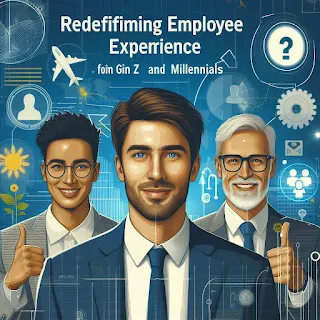As the workforce continues to evolve, businesses are increasingly focused on creating meaningful employee experiences that resonate with Gen Z and Millennials. These generations, born between 1981 and 2012, are driving significant cultural shifts in the workplace, prioritizing purpose, flexibility, and well-being over traditional perks like job titles and corner offices.
Understanding the Expectations of Gen Z and Millennials
Gen Z and Millennials value work-life balance, meaningful work, and a sense of purpose. They seek employers that align with their personal values, provide opportunities for growth, and foster a sense of community. To attract and retain this talent, companies must rethink their approach to employee experience. This includes offering flexible work arrangements, supporting mental health, and promoting diversity and inclusion.
Key Trends Shaping the Modern Workplace
Some of the key trends redefining employee experience include:
- Flexible Work Arrangements – Remote work, hybrid models, and flexible hours are no longer just perks but essential requirements.
- Focus on Mental Health – Companies are investing in mental health support and wellness programs to promote employee well-being.
- Purpose-Driven Work – Younger workers want to make a difference, pushing companies to focus on sustainability, social impact, and ethical practices.
- Digital-First Communication – Seamless digital communication tools are critical for collaboration and connection in a distributed workforce.
- Personal and Professional Growth – Continuous learning opportunities and career advancement are key drivers for younger employees.
Challenges in Retaining Younger Talent
Despite their enthusiasm, Gen Z and Millennials are known for high turnover rates. Companies must address factors like career development, meaningful work, and a supportive culture to reduce attrition and build long-term loyalty. This also means fostering a culture of continuous learning, providing mentorship opportunities, and ensuring fair compensation.
Building a Future-Ready Workforce
As these generations become the dominant force in the workplace, businesses must continue to innovate their employee experience strategies. This includes embracing new technologies, fostering inclusivity, and building cultures of trust and transparency. Companies that succeed in this transformation will be better positioned to attract and retain top talent, drive innovation, and maintain a competitive edge.
Conclusion
The expectations of Gen Z and Millennials are reshaping the future of work. By focusing on purpose, flexibility, and holistic well-being, businesses can build a resilient, engaged workforce ready to tackle the challenges of tomorrow.
For more insightful articles on technology and career growth, visit Code to Career.




0 Comments